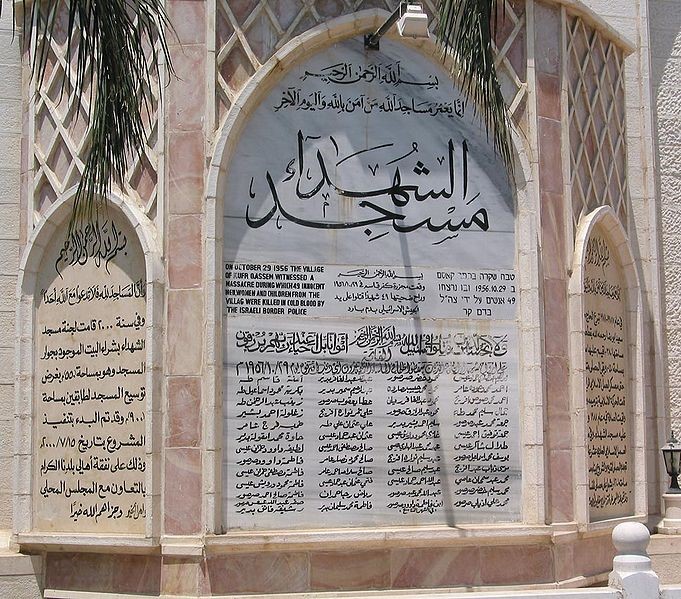Thousands of Arab-Palestinians on Tuesday marked the 57th anniversary of the massacre which took place in the Arab city of Kufr Kassem in Israel. The massacre was carried out by Israeli Border Police officers and resulted in the death of 49 civilians. The massacre took place on October 29, 1956 when a sergeant from the Israeli border guard informed Kufr Kassem’s mayor that a curfew would be imposed on the village, and asked him to inform village residents.
Only 30 minutes before the new curfew time, the mayor tried to convince the Israeli officer that about 400 villagers whose work took them outside the village would not be able to able to receive the warning in time. The officer told him that his soldiers would take care of that. The villagers who were home complied. Meanwhile the officers posted themselves at the village gates. Before long the first batch of villagers back home on bicycles, came into sight unaware of the curfew. They were met by the soldiers who shot them at a close range. Others, unaware of the danger awaiting them, started to reach the village entrance. They were met with the same fate.
News of the massacre leaked out almost immediately. However, it took two months of lobbying by communist Knesset Members Tawfik Toubi and Meir Vilner, and members of the press, before the government lifted the media blackout imposed by Prime Minister David Ben-Gurion. To limit publicity, a military cordon was maintained around the village for months, preventing journalists from approaching
Following public protests, eleven Border Police officers and soldiers involved in the massacre were charged with murder. On October 16, 1958, eight of them were found guilty and sentenced to prison terms. Malinki received 17 and Dahan 15 years imprisonment. The court placed great emphasis on the fundamental responsibility of Shadmi, though the latter was not a defendant. Shadmi was subsequently charged as well, but his separate court hearing (February 29, 1959) found him innocent of murder and only guilty of extending the curfew without authority. His symbolic punishment, a fine of 10 prutot, i.e. a grush (one Israeli cent), became a standard metaphor in Israeli polemic debate. The fact that other local commanders realized they had to disobey Shadmi’s order was cited by the court as one of the reasons for denying Dahan’s claim that he had no choice.
The court of appeal (April 3, 1959) reduced Malinki’s sentence to 14 years and Dahan’s to 10. The Chief of Staff further reduced them to 10 and 8 years, then the Israeli President reduced them to 5 years each. Finally, the Committee for the Release of Prisoners ordered the remission of one third of the prison sentences, resulting in all the convicted persons being out of prison by November 1959.
MK Mohammed Barakeh, chairman of Hadash, said during the rally held on Tuesday that “unfortunately, the anniversary of the massacre is relevant more than ever before. The idea of a (population) transfer, which was the guiding principle of the massacre, has become the official discourse of the right wing Israeli government.” Barakeh added, “We sense the danger but do not fear the racists. We will defeat them one day.”



